Persona 4 The Golden Animation - Episode 6 (Big Persona 4 Spoilers)
By FluxWaveZ 6 Comments
So, personally, I think the on-going Persona 4 Golden anime has been pretty poor so far. Revolving around a character I was indifferent towards and oftentimes frustrated by—Marie—a lot of the nuance of Persona 4 has been lost in the transition to this 12 episode series in order to mainly focus on all of the new content that the Vita game introduced.
[Again, spoiler warning for Persona 4]
I'm writing this, however, because the newest episode, episode 6, was amazing—especially compared to the previous episodes—and it's one I think anyone who is a fan of Persona 4 should definitely watch. Because P4GA assumes the viewer is familiar with the Persona 4 story in its entirety, it was able to produce this great episode featuring the culprit, Adachi, and give us more insight concerning his backstory, his psyche and the motivation behind his crimes.
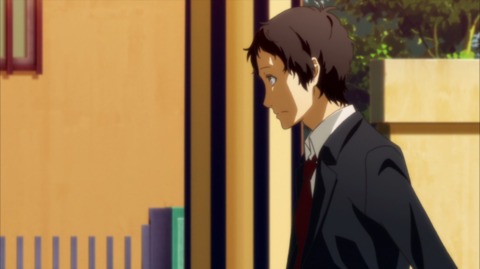
In the opening scene, Adachi is simply walking in the town at sunset. Juxtaposition—which is a technique this episode often uses—is used here to highlight him walking alone, overhearing others speaking to people they care about while expressing hopes for their future. Adachi soon stops, looks to the sky and sighs, suggesting a longing for something he desires or that he may have at some point: the feeling of belonging and having hopes, one aspect of his character that wasn't elaborated upon so much in the game.
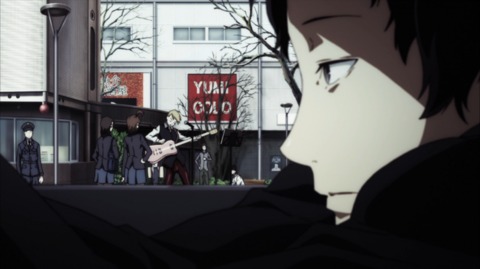
The episode then skips back to before the events of Persona 4 started, when Adachi first arrives in Inaba. Dude's depressed, shown by his despondent expressions while miserably waiting in traffic and the lighthearted moments outside that he observes. There's also the fact that the flashback scenes in this episode have a colder color composition compared to the ones in the present, which also lends to the mood.
He meets Dojima for the first time, and immediately comes to the conclusion that he's not someone he'll be able to get along with; he has no desire to work "in the field" like Dojima does. Dojima, however, immediately welcomes Adachi and says that he should consider Dojima's residence as his own home.
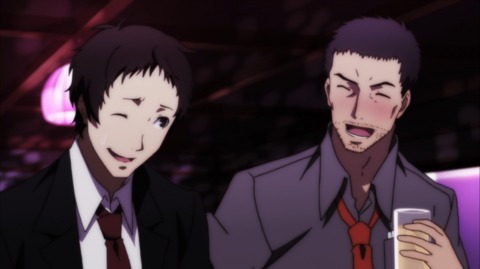
Then begins the montage of happy detective work time where Adachi is walking around with Dojima (along with accompanying happy music), working on small crimes since Inaba has a low crime rate. This includes several moments of bonding with Dojima. Scenes like these would lead one to think that Adachi's life is looking up, and that maybe the small hick town he was depressed to be moved to isn't so bad after all, which was the case with Yosuke when he met new friends he could count on.
This isn't the case, though (obviously). Adachi rejects that sort of relationship with Dojima, whether out of fear, because of his apparent self-esteem issues or because of the fact that what he wants the most is to feel totally desired by someone else.
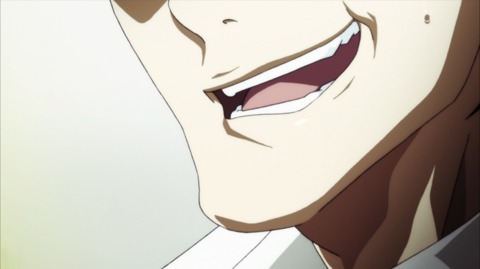
He then discovers the Midnight Channel firsthand. Abandoning rationality, he gives in to the idea behind the rumors that the one he sees on the screen is his soulmate, wanting to believe so strongly that she would be one who desires him, discovering his powers in the process and enkindling his madness. Now he could have control of his own destiny, and not the world that he perceived was working against him. Immediately, the phone rings from Dojima calling him, snapping him out of his moment of lunacy as a reminder that there's someone who would be willing to be there for him, yet the phone call is but a nuisance to Adachi.
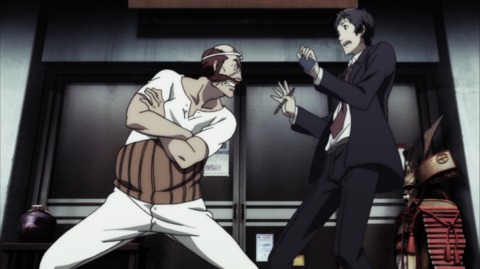
Adachi is then shown "pounding the pavement", investigating by himself while Dojima has the day off. It's something he wasn't used to doing before, as he had an office job, but the scene in question, showing him wander around questioning the townsfolk, demonstrates that he is getting better at it, learning about the town and memorizing its locations. This is also the only moment he is seen consuming anything that isn't alcohol with the steak skewers (representing some shift towards normalcy that isn't an implied alcohol problem to drown his sorrows).
Much like the montage of Adachi getting along with Dojima, I believe this represents Adachi's "other side." The side of himself that proves he can get along with other people and better his future by adapting and learning. The side of himself that he either rejects or completely ignores—acting impulsively, but internally abhorring his actions—due to his anti-social nature.

It's not a side of himself that he doesn't want to inhabit, though, as he calls up Dojima simply to have someone to casually talk to. When he gets cut off because Dojima is busy, this is the first evident sign of Adachi's inability to handle rejection in any form, perceiving Dojima hanging up so that he can focus on preparing for his Nephew's arrival as an attack against his value as a human being, or that he's been seen as inferior, just like when he was sent to the hick town that is Inaba.
This leads to Yamano's murder. Motivated by the illusion that Yamano was his soulmate, he presumably spent the evening on guard detail intentionally being very nice and kind to her, with her most likely denying any of his blatant, romantic advances. So, Adachi confronts Yamano directly and demands to have an answer regarding the validity of her supposed affair, revealing his true colors in the process.
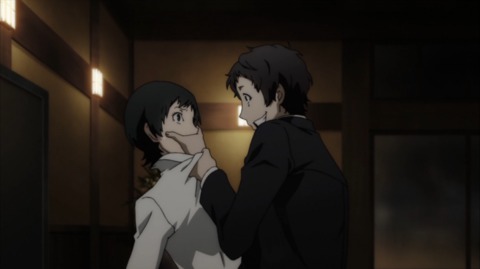
She answers dismissively, which causes Adachi to snap. It's an act of betrayal, not only to her husband, but to him, as he believed her to be his soulmate, and she couldn't possibly want to lie to him, or even choose someone over him. Well, she does, and Adachi is once again left feeling inferior, unwanted, betrayed and replaced by someone better than who he is. This time, though, he has the power to control the outcome for himself instead of being left defeated, so he seizes the moment and does what he does, feeling no remorse afterwards.
This is followed by a scene where Adachi looks into the Dojima household at night, seeing the happy family that has gathered with him alone, in the rain. His sad expression quickly turns to hatred, as he recalls how Dojima was the person who "betrayed" him during the one time he tried to reach out to someone by his own volition, through the phone call that Dojima quickly dismissed.

Murder #2. Adachi straight up spells out his internal turmoil when he aggresses Saki Konishi after being denied his advances, despite the fact that she "fools around" with Namatame: "Why is it that I'm not good enough?" Much like during the first moment where he shows his crazy, Dojima immediately tries to contact Adachi through the motif that is his cellphone, which Adachi ignores as he's busy with his other thing. The camera cuts back and forth from Adachi's expression to the ringing cellphone and, right before he pushes Saki into the TV, there's a small hint of regret in his eyes, as though Dojima trying to contact him was an indication of a life he could have had.
He listens to Dojima's message after the act: an invitation to have dinner with him that night. He laughs it off; obviously there's no going back. Even if he didn't kill Konishi and picked up the phone, he had already killed Yamano in his attempt to defend his ego or his worth as a person.
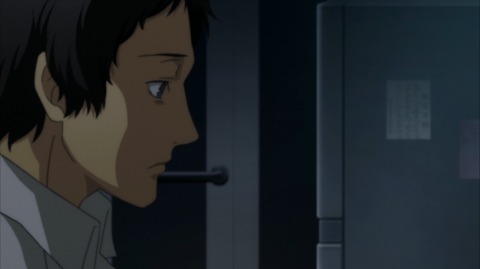
Adachi subsequently reminisces about a grandmother who expresses a particular care for "Tohru-chan" and often comes up to him, as Adachi reminds her of her grandson of the same first name and looks. She brings stew to him so that he may take care of himself and, though he claims it's a bother, Yu perceives that he's actually happy about the attention she's giving him.
A few months later, the grandmother calls out to "Tohru-chan" and, Adachi, bracing himself thinking she's calling him, realizes that, this time, she's talking to her actual grandson, speaking of preparing stew for him instead of the now labeled "Mr. Detective." Another emotional betrayal, where Adachi's been replaced by someone more important than he is. "So it doesn't have to be me after all, huh?"
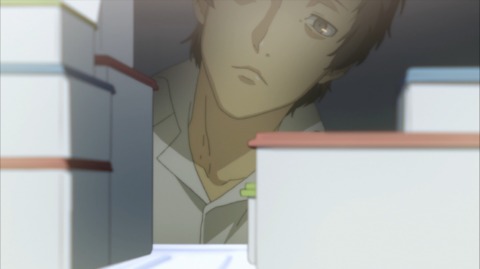
Out of kindness after witnessing this, Yu prepares boxed food for Adachi and gives it to him, which Adachi reluctantly accepts. Yu invites him to have dinner, which Dojima and Nanako would appreciate. Yu gives boxed lunches to Adachi from leftovers they had from the supper. This leads to one of the most surprisingly effective scenes in the episode, where it skips back to the present and Adachi is staring into his fridge, full of the untouched boxed lunches and dinners that Yu had prepared for him.
He thinks back to moments of "happiness" such as gardening with Yu and Nanako or attending a concert, contrasted with moments of "despair" where he murdered Yamano and Konishi. Adachi then gathers the stacks of boxes of untouched food... and throws them all away, including a pot of stew he had received from the grandmother. He rejects these ideas of "happiness", rejects the "pity food" he was given by Yu and rejects Yu's notion of "helping each other out."
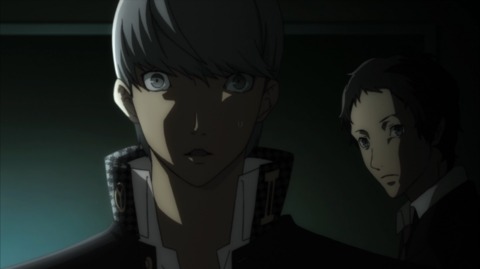
The episode finishes with a great conclusion where Adachi gives further incite into his character by stating "What you do for someone else isn't always good for that person" and warns Yu about trusting others, which Yu denies. The episode finishes with quick sequences where Nanako is kidnapped, Dojima suffers an accident, Yu faces Kunino-sagiri to save Nanako and where Nanako dies. Adachi, to himself, denies all responsibility for this, blaming Yu for everything that happened, demonstrating how Adachi does not claim responsibility for his actions and chooses to blame it on something—or someone—else.

Way longer of a write-up than I thought it'd be going in, but I guess I just loved the episode that much. It pretty much justifies the entire existence of this seemingly redundant anime series for me, and I don't think they'll be able to top it in the remaining 6 episodes. A lot of what this episode covers was presented in the game, but expounded upon in an effective way here. It's really great to see that they didn't do a sloppy job with the subject matter, but actually pulled it off.